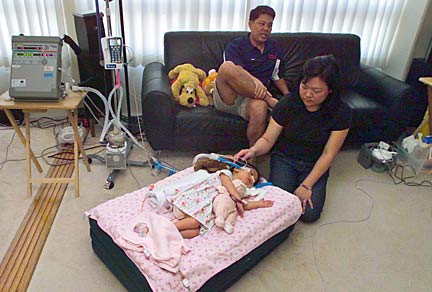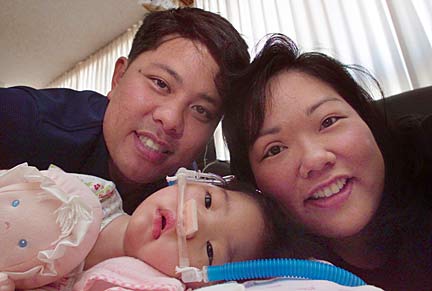
Rob and Jennifer Murakami's daughter Erin was born with spinal muscular atrophy.
Erin’s story
The 14-month-old girl was
born with a fatal disease
called spinal muscular atrophy
Erin's parents have been told she probably won't see her second birthday.
But Jennifer and Rob Murakami don't think about that. They're focused on giving their 14-month-old daughter the best possible care and quality of life.
Lying motionless on a futon in a pretty dress with her arm around a doll, Erin Sarah Akiko looks like a doll herself.
"She loves music and all things kids like," said Jennifer. "She enjoys moving around, range of motion."
But spinal muscular atrophy prevents her from moving herself. Her parents and caregivers move her arms, legs and hands, doing it playfully to music.
"Up, down, up, down, there you go," says Jennifer, 33, as she moves Erin's hands.
Spinal muscular atrophy affects the part of the nervous system that controls voluntary muscles used for such activities as crawling, walking, head and neck control and swallowing.
"There is nothing wrong with her hearing, vision or cognitive function," her mother said. "Her brain is fine. It's just lack of muscles, which unfortunately control breathing and respiration."
Some parents of children with SMA, the leading genetic killer of children under age 2, choose to provide "comfort care," Jennifer said.
But she and Rob, 37, both educators, have taken an aggressive approach in caring for their first-born, doing whatever they can to stimulate and improve her health.
They're hoping progress will be made in clinical studies of treatments for the progressive disease, Rob said.

Rob and Jennifer care for little Erin at their home with the help of nurses, family and friends. "Some days are tough," Jennifer said. "Like the day when she could no longer smile."
A former lawyer now teaching at St. Louis School, Rob said Erin "was always kind of floppy." But being new parents, they didn't recognize anything wrong when they took their newborn home in June 2004.
His mother, Dot Murakami, a retired teacher, thought something was wrong but didn't know what, he said.
Within about two months, Erin's breathing became labored and "her coloring was funny," Jennifer said.
The baby was diagnosed with the motor neuron disease and Jennifer and Rob were tested for the recessive gene. Both are carriers, but they don't know of any family member who actually had the disease until Erin.
One in every 6,000 babies is born with the disease and one in 40 people is a carrier, Rob said. "A lot of people don't know how prevalent it is."
About 25 percent of children born to carriers have SMA, 25 percent are normal and 50 percent are carriers, Jennifer said.
Erin was in intensive care at Kapiolani Medical Center for Women and Children for seven months.
"We were scared to even bring her home," Jennifer said. But they tired of the hospital and felt she would have a better life in their Iolani Court Plaza apartment, she said.
Besides the usual things new parents have to learn about a baby, Jennifer and Rob had to master a batch of life-saving machines.
Erin is unable to swallow because of her muscular condition, so she is attached to a feeding machine and fed through a tube in her stomach.
Every 10 minutes, she must be suctioned to clear her mouth and throat of secretions. Three times a day, or more if needed, she has cough treatments with a machine that forces gusts of air in and out of her lungs.
"She hates it but she's used to it," Jennifer said. "I tried it on myself. It's a horrendous machine."
The infant is also on an oxygen saturation and heart rate monitor and at night she is on an apnea monitor that goes off if she stops breathing.
"Before, she could be off the ventilator for periods, but recently she can't tolerate being off," Jennifer said.
Erin was readmitted to the hospital for three days in June because the ventilator was acting up and they couldn't get her to a doctor.
The couple must grab the cough machine and act fast to suction the child and cover her nose and mouth with a bag of room air if her breathing is blocked and she turns blue. "We can do what we have to do but it just wipes you out," Jennifer said.
Erin weighed 5 pounds, 11 ounces at birth and was 18.5 inches long. Now she's in the normal height range for a child her age but way below the normal weight, her mother said.
She's "a pretty good baby," her father sad. "The only time she'll cry is if she's uncomfortable ... If she wants something, she will make some noises."
"A lot of things we can tell by her eyes ... For her, a good day is if she's stable, no blue spells and she's smiling."
She responds to "her favorite friend, Elmo, or a book," Jennifer said. And she loves baths because her arms and legs move with the water.
But it's a tricky process, again requiring two people. Rob holds her in a little infant tub in a wading pool in the living room, near her life-saving machines. He holds the vent on her nose while Jennifer bathes her.
She knows of four other children with SMA, three with Type 1 like Erin and one with a less severe type. She went to a birthday party last week for a Type 1 child who turned 2.
Jennifer said Erin can't tolerate a regular infant car seat. They have ordered a special wheelchair. Transporting her, even from bed to futon, is difficult because of all the equipment involved.
Their insurance, plus Medicaid, is covering expenses for Erin.
Otherwise, the couple is on one-teacher income. Jennifer, a third grade teacher at Lunalilo Elementary School, is on sick leave, with days donated by friends running out.
They receive strong support from Rob's parents, Dot and Les Murakami, the retired University of Hawaii baseball coach; Jennifer's mother, Sandy Urata, and the couple's sisters and friends "who hang with me and tell me what's going on with the rest of the world," Jennifer said.
On most weekdays they have nurses, but coverage isn't always good, Rob said.
"You just do," Jennifer said of Erin's arduous care. "Some days are harder than others."
They appear to have adapted to the strenuous regimen but Jennifer said, "We have our moments."
She said she cried when Erin recently lost her smile and it didn't return. "We're working on massaging those muscles and cheeks."
The couple wants more children but will have the egg and sperm tested for the abnormal gene.
"We wouldn't want another child to go through this whole thing and it's emotionally taxing on us," Jennifer said.
E-mail to City Desk
[News] [Business] [Features] [Sports] [Editorial] [Do It Electric!]
[Classified Ads] [Search] [Subscribe] [Info] [Letter to Editor]
[Feedback]
